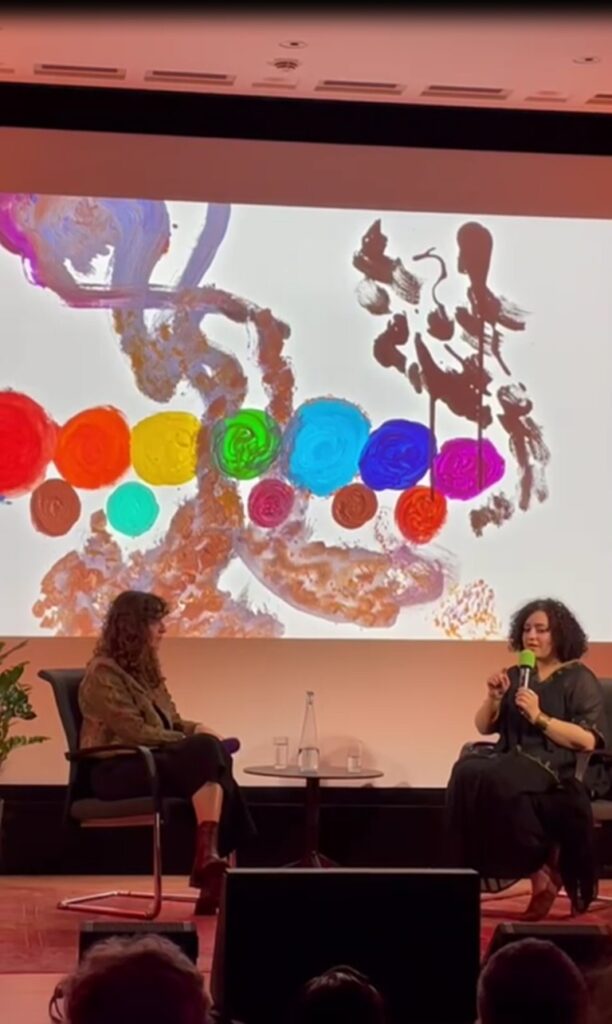
A Scholarly tribute to Halim El-Dabh: Archival Sound and Experimental Music in a University-Led Residency Performance
As part of the Beyond 1932 artist residency program, an initiative funded by UKRI/ERC and hosted by the Music Department at King’s College London, a multidisciplinary lecture-performance titled “The Sonic Legacy of Halim El-Dabh” was held on Monday, 31 March, at the British Library’s Pigott Theatre. The event was led by Egyptian visual and sonic artist Sara Hamdy, who presented a reflective performance combining research, sound art, and vocal experimentation.
The performance paid homage to the pioneering work of Halim El-Dabh (1921–2017), the Egyptian American composer and ethnomusicologist whose contributions to early electronic music positioned him among the global innovators of musique concrète. Hamdy’s presentation explored El-Dabh’s experimental sonic language through graphic scores and live vocal work, drawing inspiration from bird sounds and archival field recordings.
Interdisciplinary Performance Rooted in Research
The event was part of the Beyond 1932 research project, which critically revisits the legacy of the 1932 Cairo Congress of Arabic Music through collaborative engagements with contemporary artists and researchers from the Arab region. The performance drew on rare recordings housed at the British Library, offering an innovative approach to understanding the intersections of post-Ottoman sonic modernity, folk traditions, and experimental sound practices.
By engaging with archival material not merely as documentation but as a living medium of expression, Hamdy’s performance underscored the potential of sound as a site of memory and resistance. The project situates music as a form of epistemology—an intellectual and cultural tool that transcends the ornamental or commercialised uses of the art form.
Halim El-Dabh: Composer, Ethnographer, Innovator
Born in Cairo and later based in the United States, Halim El-Dabh was not only a pioneer in early electronic music but also a cultural theorist whose practice bridged composition and ethnographic research. His 1944 composition The Expression of Zaar, recorded on a wire recorder, is considered one of the earliest works of musique concrète. El-Dabh’s oeuvre merged sound experimentation with a deep engagement in Egyptian mythology and folk culture, leaving behind a legacy that continues to influence sound artists and researchers worldwide.
About the Artist: Sara Hamdy
Sara Hamdy is the third artist-in-residence at King’s College London’s Music Department. Based in Egypt, her interdisciplinary work spans visual art, sound, text, and performance. She is the founder of Sonic Spaces, a participatory archive and research platform dedicated to sonic arts in Egypt and the Arab world. Hamdy is a graduate of the Faculty of Fine Arts, Helwan University (2009), and has participated in numerous regional and international residencies, including Ashkal Alwan in Lebanon, MASS Alexandria, Pro-Helvetia in Switzerland, and All-Around Culture.
Curated with Scholarly Intent
The residency program is curated by Dr Rim Irscheid, a postdoctoral researcher at King’s College London, whose work addresses curatorial activism, cultural policy, and sonic arts in Lebanon, Palestine, and diasporic communities. As part of Beyond 1932, Dr. Irscheid collaborates with practitioners from Palestine, Syria, Lebanon, Egypt, and Iraqi Kurdistan to examine contemporary sound practices that both respond to and challenge the historical frameworks of the 1932 Cairo Congress.
Music as Thought, Memory, and Human Value
The event exemplified a broader intellectual stance toward music—not as mere aesthetic embellishment but as a vehicle of critical thought, ethical engagement, and cultural dignity. As embodied in El-Dabh’s and Hamdy’s work alike, music gains value when its practice escapes the confines of superficiality and instead serves to elevate human consciousness and uphold universal values of truth, memory, and artistic freedom.
Abbas Alsadeq is a composer and a researcher in ethnomusicology, cultural anthropology, and history. He is currently in the second year of his PhD program at the Department of Music, King’s College London. He holds a master’s degree in Comprehensive Traditional Music Studies, with a focus on the intricate interplay between music, culture, and history. His academic work specialises in the music and anthropology of Islam, exploring the rich and diverse musical traditions within Islamic cultures.

